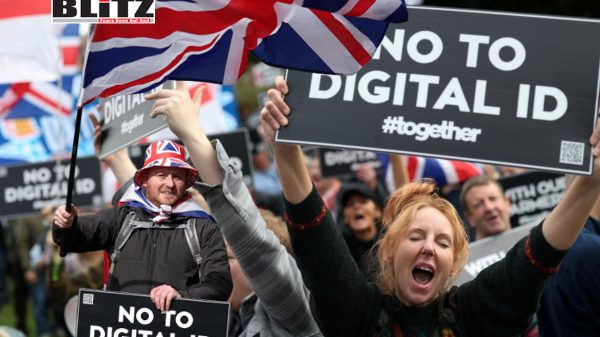Digital ID cards threaten privacy and freedom in the United Kingdom
- Update Time : Saturday, October 4, 2025

The UK government has once again revived discussions around the creation of digital identification cards, framing the move as a necessary modernization of state infrastructure and a tool for efficiency, convenience, and security. Ministers have argued that digital ID systems could help citizens more easily prove their identities, access public services, and prevent fraud. On paper, the pitch may sound like a step toward progress. But scratch beneath the surface, and it becomes clear that digital ID cards could put the United Kingdom on a dangerous path – one that risks undermining civil liberties, entrenching surveillance, and exposing citizens to unprecedented forms of control.
The UK has long resisted the idea of mandatory ID cards. The Identity Cards Act, introduced under Tony Blair’s Labour government in 2006, faced heavy public backlash. Critics raised concerns about privacy violations, government overreach, and the creation of a centralized database of personal information. After years of political wrangling, the scheme was finally scrapped in 2010, and the data collected was destroyed.
This resistance reflected a deep-rooted national skepticism of centralized state power and a commitment to individual liberty. In many ways, it also drew a line in the sand: the state should not have the ability to monitor and control every aspect of citizens’ lives. Yet today, the rebranded push for digital ID cards threatens to reintroduce what was once rejected – only this time with a more sophisticated, technological veneer.
Digital ID cards would inevitably link to vast networks of personal information. At minimum, they would contain data like names, addresses, and dates of birth. But to function in the digital economy envisioned by policymakers, they could also include biometric information such as fingerprints or facial recognition scans, as well as records of healthcare, employment, education, and even financial activity.
The danger lies not only in what the cards hold but in how they could be used. Linking citizens to digital platforms gives the state and private corporations unprecedented visibility into people’s lives. This turns identification from a static document into a tool of real-time monitoring. It could enable authorities to track movement, monitor transactions, and build detailed profiles on every individual.
Once such an infrastructure is in place, the scope of its use will inevitably expand. Today, the justification might be fraud prevention; tomorrow, it could be tax enforcement, counter-terrorism, or even monitoring “anti-social behaviour.” Over time, digital IDs risk creating the foundation for a full-fledged surveillance state.
Countries that have implemented digital ID systems offer important lessons. India’s Aadhaar program, the largest biometric identification system in the world, was originally marketed as a way to streamline welfare distribution. While it has provided some efficiencies, it has also been plagued by data breaches, identity theft, and cases of vulnerable citizens being denied essential services due to technical errors.
China provides an even starker example. Its national ID system is tightly integrated with digital surveillance tools, financial services, and the infamous social credit system. This creates an environment where citizens’ access to opportunities and freedoms can be restricted based on their behaviour, political views, or even minor infractions.
The UK may not be China, but introducing digital IDs would open the door to similar abuses of power. Once citizens accept the principle that the government can hold and manage their digital identities, the barrier to expanding that system into more intrusive directions becomes dangerously thin.
Beyond concerns about surveillance, digital ID systems also pose significant cybersecurity risks. Centralized databases become lucrative targets for hackers. No matter how robust the technology, breaches are inevitable – as seen with repeated hacks of government and corporate systems worldwide.
If biometric information or core identity credentials are compromised, the damage cannot simply be undone. Unlike a password, you cannot change your fingerprint or your face. A major breach could leave citizens permanently vulnerable to identity theft and fraud, with devastating personal and financial consequences.
Perhaps the greatest danger is how easily such systems become normalized. Once digital ID cards are in circulation, private companies will rush to integrate them into daily transactions. Employers may demand them for hiring, landlords for renting, and banks for opening accounts. Citizens who resist could find themselves locked out of essential services, effectively coerced into participation.
This gradual entrenchment transforms a voluntary scheme into a de facto mandatory system. What starts as a convenient “option” quickly becomes the only way to function in modern society. This is how control systems grow: not through immediate compulsion, but through creeping normalization until resistance becomes practically impossible.
The UK must recognize that efficiency and convenience cannot come at the expense of fundamental freedoms. The promise of streamlined services and fraud reduction pales in comparison to the risks of mass surveillance, data abuse, and authoritarian creep.
Instead of investing in centralized digital ID cards, the government should focus on improving existing systems with stronger data protections, decentralized verification methods, and voluntary privacy-preserving technologies. Innovation does not require surrendering liberty.
The revival of digital ID card proposals in the UK is not a harmless modernization project; it is a profound shift with far-reaching consequences. It risks turning identification into a tool of surveillance, creating cybersecurity vulnerabilities, and normalizing systems of control that undermine the very freedoms British society claims to value.
History has already shown that citizens are wary of such schemes – and for good reason. To accept digital ID cards now would be to abandon that skepticism and step onto a path toward a more monitored, less free society. If the UK truly values liberty, it must resist this dangerous temptation once again.










